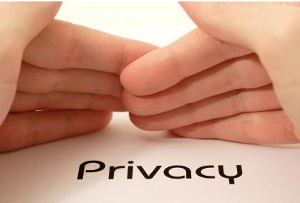12.請(qǐng)保護(hù)你的隱私
Psychologists tell us boundaries are healthy, that it's important to reveal yourself to friends, family and lovers in stages, at appropriate times. But few boundaries remain. The digital bread crumbs you leave everywhere make it easy for strangers to reconstruct who you are, where you are and what you like. In some cases, a simple goolge search can reveal what you think. Like it or not, increasingly we live in a world where you simply cannot keep a secret.
心理學(xué)家告訴我們和別人保持界限是健康的,而且在適當(dāng)?shù)臅r(shí)機(jī)逐步地向你的朋友、家人和戀人透露你的個(gè)人情況很重要。但是現(xiàn)在已經(jīng)沒(méi)有多少界限存在了。你處處留下的“數(shù)字面包碎屑”很容易讓陌生人推向出你是誰(shuí),你在哪里,你對(duì)什么感興趣。在有些情況下,一次簡(jiǎn)單的Google搜索就可以暴露你的想法。無(wú)論我們喜歡與否,我們?cè)絹?lái)越生活在一個(gè)無(wú)法保密的世界里。
The key question is: Does that matter?
問(wèn)題的關(guān)鍵是:這很重要嗎?
For many Americans, the answer apparently is "no".
對(duì)于許多美國(guó)人來(lái)說(shuō),答案很顯然是“不重要”。

When opinion polls ask Americans about privacy, most say they are concerned about losing it. A survey found an overwhelming pessimism about privacy, with 60 percent of respondents saying they feel their privacy is "slipping away, and that bothers me."
在一次關(guān)于隱私的美國(guó)民意調(diào)查時(shí),大部分人很擔(dān)心失去它。有一項(xiàng)調(diào)查發(fā)現(xiàn),人們對(duì)于隱私的安全性非常地悲觀,60%的被調(diào)查者說(shuō)他們感覺(jué)“隱私正離他們遠(yuǎn)去,這讓他們煩惱不已。”
But people say one thing and do another. Only a tiny fraction of Americans change any behaviors in an effort to preserve their privacy. Few people turn down a discount at tollbooths to avoid using the EZ-Pass system that can track automobile movements. And few turn down supermarket loyalty cards. Privacy economist Alessandro Acquits has run a series of tests that reveal people will surrender personal information like Social Security numbers just to get their hands on a pitiful 50-cents-off coupon.
但是人們言行不一。只有一小部分美國(guó)人改變自己的行為,以保護(hù)自己的隱私。很少有人會(huì)拒絕收費(fèi)站的打折,本來(lái)若是拒絕的話就可以避免使用能跟蹤汽車(chē)行蹤的EZ-Pass系統(tǒng)。很少有人會(huì)拒絕超市的會(huì)員優(yōu)惠卡(積分卡)。隱私經(jīng)濟(jì)學(xué)家壓力山德羅·奎斯蒂進(jìn)行了一系列的測(cè)試,表明人們會(huì)透露像社保卡號(hào)這樣的個(gè)人信息,就只是為了能拿到微不足道的便宜50美分的優(yōu)惠券。
But privacy does matter — at least sometimes. It's like health: when you have it, you don't notice it. Only when it's gone do you wish you'd done more to protect it.
但是隱私的確很重要——至少有些時(shí)候是這樣。它就如同健康:當(dāng)你擁有它時(shí),你沒(méi)有注意它,當(dāng)你失去它后,你才后悔你沒(méi)有盡力保護(hù)好它。












